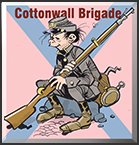mdsmall
Posts: 461
Joined: 4/28/2020
From: Vancouver, BC
Status: offline

|
Bill - Thank you for being open to thinking about how the post-surrender mechanics for major powers in the game might be changed. This line of thinking opens up some potentially interesting late-game scenarios that rarely emerge in the current game.
In my view, there are no problem with the existing game mechanics for major powers that surrender as intact states. For example, in one of my games playing the Central Powers against the AI, I invaded Italy and after a tough campaign, the Italians surrendered. All the Italian forces disappeared from the board and all of the unoccupied hexes formerly belonging to Italy became Central Power occupied hexes. However, the sizeable French force that was defending Savoy and controlling Turin were fine. They controlled their own supply lines back to France and they continued to fight on against the invading Austrians as if nothing had happened. A couple of British and French units that were fortifying the Italian lines in the Apennines found themselves out of supply. But against a human player who could foresee that there was a risk that the Italians would surrender, it would have been easy to secure access to a port for those units before that happened, so they could remain in supply and/or be evacuated.
The situation becomes more complex when the surrendering major power breaks up into several new, independent minor states. This currently happens with Austria-Hungary and with Russia in the WW1 game (I presume it happens to the Ottomans too). What I would like to see changed is having all the units of other major powers on the territory of the surrendering power being automatically “teleported” back to their home territory to avoid having them inside the borders of the newly independent, neutral states. Here is one way I think you could do this.
Let’s continue to work with the Austro-Hungarian example that started this thread. When the A-H empire surrenders, all of its units disappear from the board. New units of the new, successor states appear on the board, as if they were partisans (following whatever game mechanics you use for anti-colonial partisans such as the Arabs). The Entente player is then presented with a Decision Event asking if he recognizes each of these new independent states.
If he says YES, then the Entente player controls these partisan units. At the end of a turn when a partisan unit has occupied its national capital, it will automatically declare independence and a new minor power appears on the board with the borders as already determined by the existing game. All other unoccupied hexes within the borders of the former A-H empire remain Entente occupied hexes until the new successor states are declared. By controlling the partisan units, the Entente player can decide when he wants that to happen.
If the Entente players says NO to recognizing a given aspiring successor state, then its units become partisans controlled by the Central Powers. The hexes of the former A-H empire remain Entente occupied. If the now CP-controlled partisans capture their national capital, they will declare independence and a new state is created. The same game mechanics apply.
When a new successor state is declared, its alignment is determined by the situation on the board. If there are units of the non-controlling side within the borders of the new state (Germany in this example), then the new state is automatically at war with the Central Powers and allied to the Entente. The German units control the hexes they occupy and have to fight their way out or into supply. If there are no Central Power units present inside the new state's borders, it becomes a neutral minor with a degree of alignment towards the Entente, as already set within the game. Any Entente units inside its borders can be “teleported” back to Entente territory, as per the existing game mechanics, so that the new state can become an independent neutral.
I would suggest creating some incentives for the controlling power to create the new states, e.g. in terms of MPP bonuses from trade (as done for Ukrainian grain supplies to Germany after the Treaty of Brest-Litovsk). One could imagine separate Decision Events providing other incentives, e.g. in terms of border adjustments or the alignment of other minors or National Morale. I would offset those a bit with some immediate penalties in terms of readiness for major power units that have just received a free move home by being “teleported”.
This approach would work very well with the Arabs when the Ottoman Empire surrenders. As soon as their existing partisan forces occupy Medina, they would declare independence (as forecast by T.E. Lawrence) and become a neutral state aligned towards the Entente. (You could create a new Decision Event that would allow them to declare independence if they capture another Ottoman capital like Damascus).
I think it would apply equally well when Russia surrenders. If the Central Powers accept the Treaty of Brest-Litovsk, then they can decide when to create the individual successor states. For the most part, I imagine they would create them immediately, and the game would proceed similar to the existing game. But in some cases, the Central Power player might prefer to remain an occupying power in part of the territory they conquered, especially if there were Entente units they wanted to attack in Romania, Turkey or Persia. If the Germans refuse Brest-Litovsk, then some of the new units could appear as partisans controlled by Russia, with the same rules applying in terms of declaring new states in the Baltics, the Ukraine and Trans-Caucasus. I don’t recall exactly what happens to Finland when it declares independence in the existing game, but I think it is very similar to what I have outlined above.
If these mechanics for creating new independent states work out, they could become the basis for future campaigns or mods covering the fascinating period after the collapse of empires from 1917 through to the end of Russian Civil War. Ideally, the game engine could control the new partisans, so they would be truly independent, rather than aspiring neutrals temporarily controlled by one side or the other. But I think the above approach could work within the existing game parameters. I leave that to you and other players who know the game mechanics to decide.
Cheers,
Michael
|
 Printable Version
Printable Version










 New Messages
New Messages No New Messages
No New Messages Hot Topic w/ New Messages
Hot Topic w/ New Messages Hot Topic w/o New Messages
Hot Topic w/o New Messages Locked w/ New Messages
Locked w/ New Messages Locked w/o New Messages
Locked w/o New Messages Post New Thread
Post New Thread